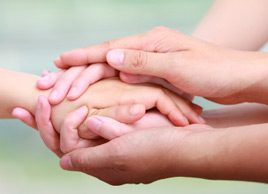10 ways to help a friend who has cancer
We often don’t know what we should’and shouldn’t’say or do when a friend is diagnosed with cancer. Here’s one woman’s first-hand advice to guide you through a difficult time

Source: Best Health Magazine, October 2010
hile Gayle Stewart of Vancouver was being treated for lung cancer last year, she offered Best Health some advice on how women can help if a loved one is diagnosed with an illness. Sadly, Gayle died in June 2009. Says her younger sister, Susu Reid: ‘She was a wonderful sister. It would have thrilled her that through this article she may be helping others.’
When asked to share her tips for this article, Gayle said that no matter how well-intentioned people are, not everyone knows how to give. Many are stopped from even sending a simple email for fear of doing or saying the wrong thing. Here are Gayle’s suggestions for how to help a friend:
1. Appoint an organizer
Via phone and Internet, Susu coordinated transportation during 23 weeks of chemotherapy and radiation. Gayle said it took some pressure off. ‘I didn’t have to feel I was twisting friends’ arms, and they could say ‘no’ if they needed to, because they didn’t know my sister well.’ About 25 friends and acquaintances volunteered to help with the driving, waiting and support through appointments.
2. Just be there
An encouraging card, email or call ‘is wonderful to receive,’ Gayle told me. She cautioned against sending information about alternative therapies, no matter how well-intentioned. Trust that your friend is surrounded by experts.
3. Be careful about flowers
Maintenance of a lot of plants and flowers can add to the household chores. Still, Gayle said, ‘it is a joy to open the door and see a bouquet.’
4. Help with chores
An offer of help is best received when it’s specific. A vague ‘How can I help?’ put the onus back on Gayle to come up with something. But an ”I see your plants need attention. I’ll clean them up’ needs only a ‘thank you’ in response. There are also things you can do that don’t require any contact’take in the garbage bins, rake the leaves, mow the lawn.
5. Label your loans
A voracious reader, Gayle gladly received and devoured many books from friends. If you are lending books, DVDs or music, label them. (The same goes for food platters.) And offer to do the sleuthing to return items to their owners.
6. Indulge her
Comfort items are welcomed, too’new pyjamas, special soaps and fresh towels can brighten her day.
7. Prepare the foods she wants
Your grandmother had it right when she headed to the kitchen at the first sign of troubles. ‘Food becomes such an issue,’ Gayle said. ‘When someone drops off a casserole, it’s wonderful.’ But keep an eye on changing tastes and needs. Gayle started her illness with a strict organic diet and welcomed the care friends took in preparing healthy soups and packets of dried fruit and nuts. When her focus was on maintaining her weight, ‘a platter of lasagna made a better choice.
8. Consider her family, too
Gayle didn’t want her husband and then 20-year-old daughter, Sara, forgotten. With all their extra duties, spouses and children may not be able to manage their meals as well, and might really appreciate a good dessert.
9. Organize servings
Package food in portions so there’s no waste. Along with the ingredients and heating instructions, add a note of encouragement to the label.
10. Keep inviting her out
Although her social outings were limited, Gayle and her husband appreciated staying on the ‘invitation lists. Bob says, even now, he may not want to participate in a night out, but ‘it’s nice to be asked.
Of course, there are many more tips that could be added to this list. The key is knowing that you can’t go too far wrong by trying. ‘Any act of caring, kindness or concern is embraced,’ Gayle said, ‘because it makes me know that people out there are thinking of me.’




